Kitten in 1-2 months: features of development and care

The decision to have a cat is a pretty big deal. It should be remembered that we are responsible for those we have tamed. Therefore, from the day the animal crossed the threshold of our house, we are responsible for it. The first months of a kitten's life are especially important.
Development features
As the kitten reaches the age of 1 or 2 months, the cat begins to pay less and less attention to its baby. During this period, the size of the animal is quite small. A month-old (and sometimes two-month-old) kitten looks pretty defenseless. The age of 1-2 months is the period when the active development and growth of the animal begins. You can begin to feed the kitten, train it to the toilet and carry out other activities as part of the educational process.
At the same time, it is worth remembering that at the moment the animal is not fully developed, so you should not demand from it to immediately master commands or fulfill your requests - a little four-legged friend is just beginning to learn.

What is needed for content?
On the very first day when the pet appears in your house, you need to take care of arranging his personal place. So, first you need to organize a toilet. Today, in zoological markets and pet stores, you can purchase a tray of any color and size.
The ideal choice for the first time is a tray with low sides. The small size of the kitten will not allow him to overcome any obstacles. Therefore, such a design will be the most comfortable and convenient for a small animal.Care must be taken to ensure that the tray is made from environmentally friendly material. You can find information on this on the packaging or consult the seller.
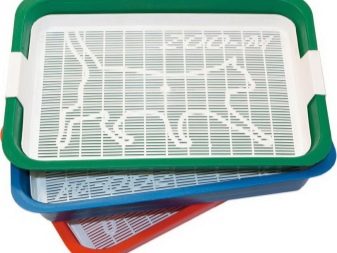
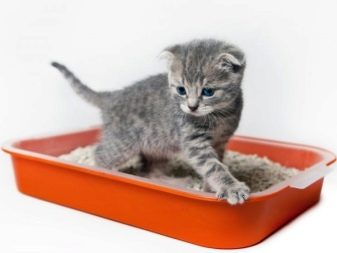
In addition to the material of the litter box itself, it is necessary to carefully select the litter for the litter box. The kitten can play with him for the first time and even taste it. Therefore, it must be safe. The most suitable in this regard is woody, eliminates odor, is sold at an affordable price, is convenient for a kitten. Or you can choose the one to which the kitten is used to in the cat's house.
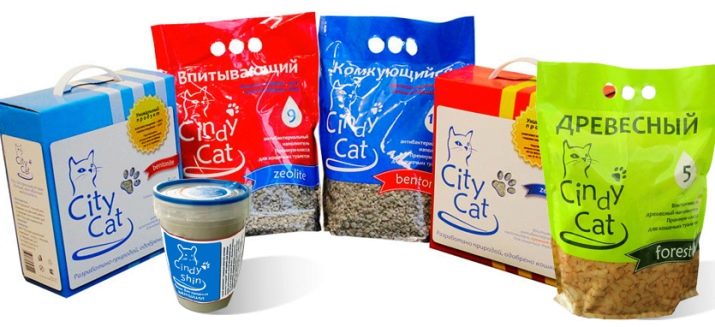
In addition, the animal needs its own place to sleep and rest. It can be a sunbed, which can be purchased at any zoological store. In the absence of such, you can arrange a cozy sleeping place for your four-legged friend on your own - for this you can use old blankets, blankets, pillows, etc. However, often at the beginning of its life, a kitten does not perceive the place offered to him. So, he can independently choose a cozy corner for himself of his own free will or will sleep next to you.
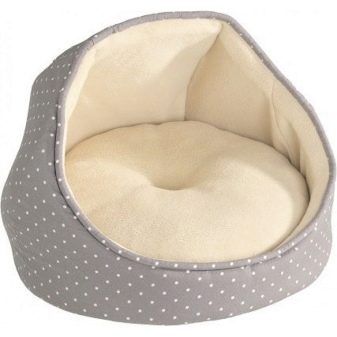

If you have sufficient financial resources, and there is free space in your apartment, then a good decision would be to purchase a special house. These designs are quite popular with pet owners. The arrangement of the so-called "dining area" is also necessary. A cat needs two bowls for food and water.
To prevent the kitten from spoiling the furniture with its claws, he immediately needs to purchase a scratching post - vertical or horizontal. It can also be made with your own hands; a regular piece of old carpet or felt will do.
You just need to fix it on a vertical surface so that the kitten is comfortable.
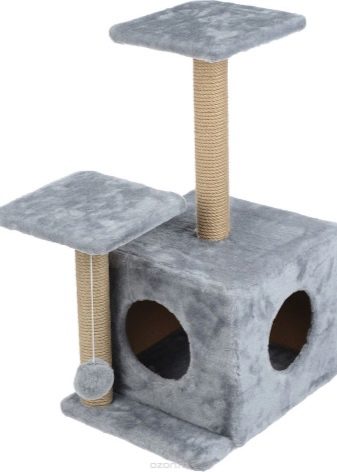

How to take care at home?
As for the grooming procedures that the kitten needs, they, first of all, should include hygiene procedures.
It should be remembered that bathing animals that have not yet reached two months is not recommended by experts. The thing is that the kitten's body during this period is fragile, and therefore a change in temperature can negatively affect its health. For the time being, hygiene care should be limited to ear cleaning and eye treatment (cotton swabs and cotton pads are recommended for this), and the oral cavity and teeth need to be monitored.
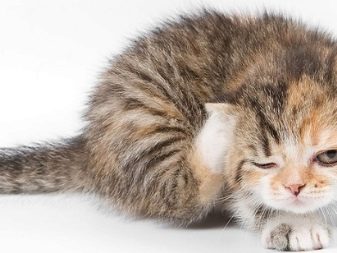

Don't forget about medical procedures. So, for example, if your new pet is a yard animal (you took it from the street or from a shelter), then first you should carry out all the necessary procedures: deworming, treatment for fleas. Vaccination is compulsory for all kittens, the necessary vaccinations will help the baby to develop immunity and protect against various diseases. If you notice any suspicious symptoms, you should see your doctor immediately.
Do not forget about the fact that small animals, like small children, need a lot of attention... In the first days after you brought the kitten into the house, you should pay extra attention to it, show affection and care. You need to pet the kitten, hold it in your arms, and also play outdoor games with it to activate it.
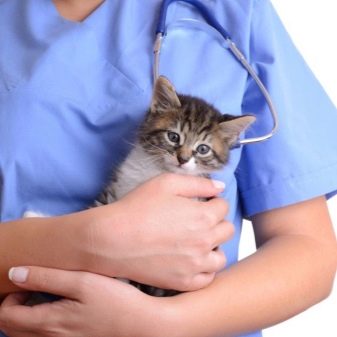
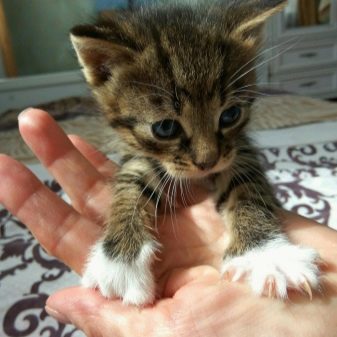
Feeding rules
Particular attention in the care of a newborn kitten deserves its diet. So, in the first days of his life, he does not need additional feeding - he receives all the necessary trace elements and vitamins from mother's milk... If we talk about additional nutrition, then it must be started to be given already from the 4th week of your pet's life. The first products that are allowed to be introduced into the kitten's diet should be fermented milk products. Moreover, it is worth choosing only those that have a low fat content. After a few days, cereals and finely chopped meat can also be added to the diet.
The portions should be small.Keep track of how much your little pet eats so as not to harm his digestive system.

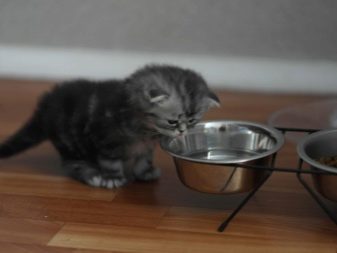
In addition, already during this period of growth and development of the animal, it is necessary to make the final choice as to what type of food you will feed the cat in the future. There are two options: dry food and organic food. If you choose the first option, then it will be useful to consult a specialist in a veterinary clinic. He will help to determine the specific brand of food, which largely depends on the breed and physiological characteristics of the animal. If you decide to feed your kitten with natural food, then remember that you should only give him fresh and high-quality food. In no case do not feed your pet scraps from the master's table.
Be prepared for the fact that at first you will have to feed your pet yourself using a syringe or pipette. However, you should not abuse such unnecessary care - gradually accustom the animal to independent food intake.


How to educate?
A lot depends on the first months of life. It is at this time that it is recommended to instill good habits in the cat.
- One of the first and most important habits you should teach your pet is going to the litter box. To accomplish this, a simple trick can be used. For example, experienced breeders recommend placing a cat in a litter tray after he has eaten or drunk.
- In addition, you should control the behavior of the animal during games and entertainment: do not let him bite and scratch you.
- Teach him to use a scratching post, show him how to sharpen his claws by hanging the toy on top. The kid will reach for her, and at the same time scratch the surface of the scratching post.
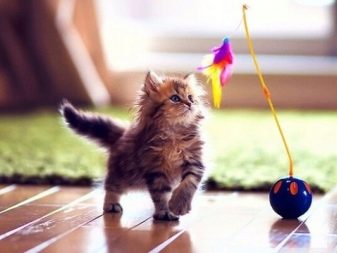

Do not show aggression towards the kitten, even if he did something wrong. The animal may remember this behavior and later experience negative emotions towards you.
For information on how to teach a kitten to walk in the tray, see the next video.
































